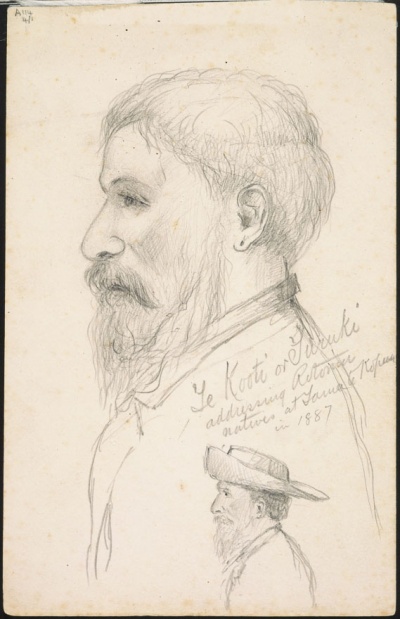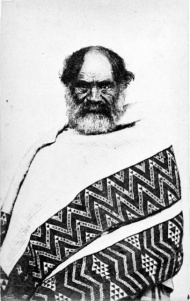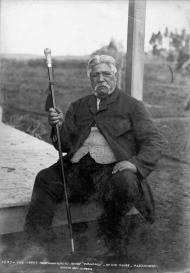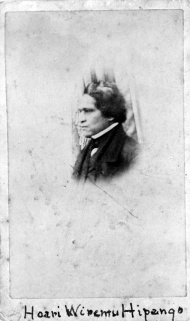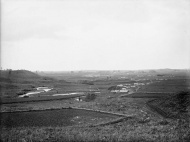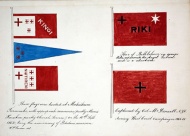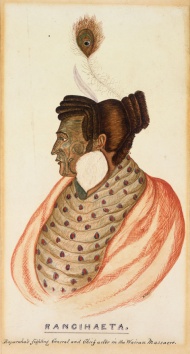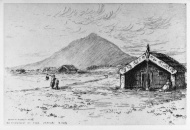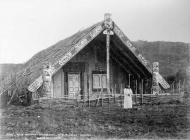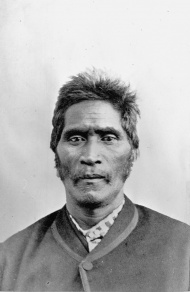Events In History
-
 23 May 1966Coronation of first Māori Queen
23 May 1966Coronation of first Māori QueenPrincess Piki, the daughter of King Koroki, was selected as the sixth Maori monarch − and first Queen − during her father's funeral, in accordance with Kingitanga protocol. She assumed her mothers name, Te Atairangikaahu. Read more...
-
 26 August 1894Death of second Māori King
26 August 1894Death of second Māori KingAs the second Māori King, Tāwhiao had led his people through the traumatic period of the wars of the 1860s. He was succeeded by his son Mahuta. Read more...
-
 13 February 1869Killings at Pukearuhe
13 February 1869Killings at PukearuheA Ngāti Maniapoto war party sacked the redoubt at Pukearuhe (White Cliffs), northern Taranaki, killing military settlers and family members. Later that day, the missionary John Whiteley also fell victim. Read more...
-
 9 June 1868Tītokowaru's war begins
9 June 1868Tītokowaru's war beginsThree settlers were killed near Ketemarae, Hāwera, by Ngā Ruahine warriors acting on the spiritual leader's orders. This signalled a change of strategy in the Māori response to land confiscation. Read more...
-
 12 July 1863British forces invade Waikato
12 July 1863British forces invade WaikatoLieutenant-General Cameron's force crossed the Mangatawhiri stream. This was the first act of war in the Waikato campaign, which had been planned in part to gain land for European settlement. Read more...
-
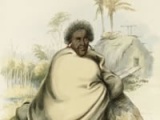 25 June 1860Death of the first Māori King
25 June 1860Death of the first Māori KingThe Māori King movement came into existence in the late 1850s as an attempt to unite the tribes, prevent land sales and make laws for Māori. Pōtatau Te Wherowhero became the first Māori King in 1858, but died two years later. Read more...
Articles
Māori King movement origins

In May 2008 Māori gathered at Ngāruawāhia to celebrate the 150th anniversary of the formation of the Kīngitanga, or Māori King Movement. The current king, Te Arikinui Tūheitia Paki, was crowned in August 2006 following the death of his mother, Dame Te Ātairangikaahu.
-
Page 2 – Overview
On 23 May 2006 the Māori Queen, Te Arikinui Dame Te Ātairangikaahu, celebrated the 40th jubilee of her coronation. She was the sixth Māori monarch and the longest-serving.
-
Page 3 – The land issue
The pressure to sell land was a key factor in the creation of the Kīngitanga. Before European settlement Māori could not sell land and few chiefs had the authority to gift land
-
Page 4 – In search of a king
The Kīngitanga has often been described as a Waikato initiative, yet its origins can be traced to Ōtaki on the Kapiti coast.
-
Page 5 – Pōtatau Te Wherowhero
In April 1857, at Rangiriri, Pōtatau agreed to become king. He was crowned and anointed at Ngāruawāhia in June 1858.
-
Page 6 – A challenge to European authority?
Pōtatau set a boundary separating his authority from that of the governor: 'Let Maungatautari [River] be our boundary. Do not encroach on this side. Likewise I am not to
Māori King movement - 1860-94

King Tāwhiao's reign was dominated by the Waikato War and its fallout.
-
Page 2 – Build up to war
Like his father, King Tāwhiao opposed the war in Taranaki. The government, however, remained unconvinced. In July 1860 Governor Gore Browne sought to isolate the Kīngitanga and
-
Page 3 – Response to war
The invasion of the Waikato united the various factions within the Kīngitanga, and during the war Kīngitanga forces had some victories despite being overwhelmed in terms of
-
Page 4 – Raupatu
Under the terms of the New Zealand Settlements Act 1863 the government confiscated 1.2 million acres (486,000 hectares) of Māori land in late 1864.
-
Page 5 – Maintaining Te Kīngitanga
By the early 1870s, the Kīngitanga was struggling. Living conditions within the Rohe Potae (the Māori King's territory) were poor. Allies such as Ngāti Hauā had begun selling
-
Page 6 – Tensions ease
It was clear by the 1870s that the Kīngitanga posed no threat beyond its borders and was in no fit shape to fight a war. Attempts were made to ease relations between the king
-
Page 7 – The death of Tāwhiao
Tāwhiao died on 26 August 1894. He was buried at Taupiri after a tangihanga in September that was attended by thousands.
Treaty biographies

Information about some of the key people who have featured in the story of the Treaty of Waitangi
- Page 1 - Treaty biographiesInformation about some of the key people who have featured in the story of the Treaty of
The 1920s

The 1920s was the decade that modern New Zealand came of age. Despite political and economic uncertainty, the country shrugged off the gloom of war to embrace the Jazz Age - an era of speed, power and glamour. Explore an overview of the decade and a year-by-year breakdown of key events.
- Page 4 - 1921 - key eventsA selection of key New Zealand events from
Maori leadership

This topic can be used to explore the theme 'Imperialism, indigenous peoples and the emergence of new nations'. It examines the nature of imperialism and its impact on the society and politics of the non-European world.
-
Page 2 – Impact of historical forces activity - Maori leadership
Examine some of the specific ways that the lives of Maori were affected by historical forces in the period from 1840 to 1870.
-
Page 3 – Key personalities activity
A number of Maori and Pakeha played a significant role in the creation of and response to the Kingitanga and Pai Marire. Their attitudes and actions are important in
-
Page 4 – Practice essay activity
Examine how a force or movement in a historical setting influenced people's lives.
-
Page 5 – Pai Mārire short answer activities
Complete some short-answer questions about Pai Marire.
The 1960s

Five decades ago most Kiwis enjoyed a standard of living that was the envy of other nations. During the 1960s the arrival of TV and jet airliners shrank our world, and New Zealanders began to express themselves on a range of international issues, including opposition to the Vietnam War.
- Page 9 - 1966 - key eventsA selection of the key events in New Zealand history from 1966
New Zealand's 19th-century wars

War changed the face of New Zealand in the 19th century. Tens of thousands of Māori died in the intertribal Musket Wars from the 1810s to the 1830s. There were fewer deaths during the New Zealand Wars (1840s-1870s) between Māori and the Crown, but the consequences were still dire for many tribes.
- Page 8 - NZ Wars flagsFor many Maori in the 19th century, the Union Jack was frequently viewed as a potent symbol of Great Britain's power in New Zealand. In the New Zealand Wars, Maori parties who
Biographies
-
 Kaihau, Henare
Kaihau, Henare
Henare Kaihau become deeply interested in Māori politics, and strongly supported the King movement, becoming a principal adviser to Mahuta, the third Māori King.
Read more... -
 Mangakāhia, Meri Te Tai
Mangakāhia, Meri Te Tai
Meri Mangakāhia petitioned the government on land rights and argued for women’s suffrage, and actively participated in the Kotahitanga movement, the Māori parliament based at Pāpāwai, Wairarapa.
Read more... -
Māngakahia, Hāmiora
Coromandel chief, Hāmiora Mangakāhia, was elected Premier of the Kotahitanga (Māori) Parliament in 1892. He petitioned for the abolition of colonial laws relating to Māori land, and asked that Māori be allowed to control their own affairs.
Read more... -
 Maniapoto, Rewi Manga
Maniapoto, Rewi Manga
A famous Ngāti Maniapoto warrior, leader and supporter of the King Movement who's exploits in the Waikato War have been immortalised in book and film.
Read more... -
 Matua, Hēnare
Matua, Hēnare
Ngāti Kahungunu chief Hēnare Matua was leader of the repudiation movement, which questioned land sales that it believed had been undertaken fraudulently.
Read more... -
 Nene, Tāmati Wāka
Nene, Tāmati Wāka
Renowned Ngāpuhi chief, Tāmati Wāka Nene, was an early friend of Pākehā. He was one of its most influential supporters in the debate at Waitangi over the Treaty and he was among the first to sign.
Read more... -
 Ngāpua, Hōne Heke
Ngāpua, Hōne Heke
Hōne Heke Ngāpua was elected to Parliament in 1893 and represented the people of Northern Māori almost continuously until his death in 1909.
Read more... -
 Ngātata, Wiremu Tako
Ngātata, Wiremu Tako
Te Āti Awa leader Wiremu Tako Ngātata was one of the first Māori members of the Legislative Council. Here he opposed legislation threatening Māori possession of land.
Read more... -
 Nireaha Tāmaki
Nireaha Tāmaki
Nireaha Tāmaki, of Rangitāne and Ngāti Kahungunu, is perhaps best known for his bitter struggle to retain lands within the large Mangatainoka block, which the government was determined to purchase for railway construction.
Read more... -
 Ormsby, John
Ormsby, John
As chairman of the Kāwhia committee, John Ormsby worked on behalf of Ngāti Maniapoto in negotiations with the Native Land Court.
Read more... -
 Parata, Wiremu Te Kākākura
Parata, Wiremu Te Kākākura
Elected to Parliament as the member for Western Māori in 1871, Wiremu Parata, took part in several high-profile court claims over Māori land.
Read more... -
 Pere, Wiremu
Pere, Wiremu
Wi Pere was a strong critic of the government's Maori land policies during his two terms as a Member of Parliament for Eastern Maori
Read more... -
 Pomare
Pomare
Pōmare II was a prominent Ngāpuhi chief who signed the Treaty of Waitangi. He was later arrested by the British on suspicion of treason but released on the intervention of Tāmati Wāka Nene.
Read more... -
 Taiwhanga, Hirini Rawiri
Taiwhanga, Hirini Rawiri
Son of Rawiri Taiwhanga, Hirini Taiwhanga petitioned Queen Victoria to change the laws that breached the Treaty of Waitangi.
Read more... -
 Takamoana, Karaitiana
Takamoana, Karaitiana
Influential Ngāti Kahungunu chief who fought in the Musket Wars during the 1820s, and later entered Parliament as a member for Eastern Māori.
Read more... -
Taonui, Aperahama
Aperahama Taonui, of the Te Popoto sub-tribe of Ngāpuhi, was a founding member of the Kotahitanga movement, which evolved into the Māori parliaments of the 1890s.
Read more... -
 Taraia Ngakuti Te Tumuhuia
Taraia Ngakuti Te Tumuhuia
Ngāti Maru and Ngati Tamaterā chief who rejected the intrusion of Europeans in the traditional Māori world.
Read more... -
 Tāwhai, Hōne Mohi
Tāwhai, Hōne Mohi
A member of the House of Representatives, Hōne Mohi Tāwhai became disillusioned in the settler-dominated Parliament and helped set up an alternative Māori Kotahitanga Parliament.
Read more... -
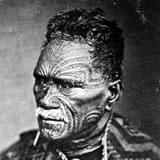 Tāwhiao, Tukaroto Potatau Matutaera
Tāwhiao, Tukaroto Potatau Matutaera
Tāwhiao's father Pōtatau was the first Māori King, and on his death in 1860 Tāwhiao inherited the kingship and the spiritual leadership of his people. He was king for the next 34 years, including the most turbulent period in New Zealand's race relations history.
Read more... -
 Te Hāpuku
Te Hāpuku
Hawke's Bay chief, Te Hāpuku, signed the 1835 Declaration of Independence and the Treaty of Waitangi. He opposed the King Movement fought against the Hauhau and Te Kooti.
Read more... -
 Te Heuheu Tūkino III, Iwikau
Te Heuheu Tūkino III, Iwikau
A paramount chief of Ngāti Tūwharetoa, Iwikau Te Heuheu was an ardent proponent of Māori nationalism, supporting the movement to set up a Māori king.
Read more... -
 Te Heuheu Tūkino IV, Horonuku
Te Heuheu Tūkino IV, Horonuku
Horonuku Te Heuheu Tūkino IV succeeded his uncle, Iwikau, as paramount chief of Ngāti Tūwharetoa. He gifted the mountains of Tongariro, Ngāuruhoe and Ruapehu to the Crown in 1887 to be part of a national park.
Read more... -
 Te Kooti Arikirangi Te Turuki
Te Kooti Arikirangi Te Turuki
Te Kooti fought on the government side in the New Zealand Wars before being exiled to the Chatham Islands on charges of espionage. He later escaped back to the mainland and fought a long guerilla war against government forces.
Read more... -
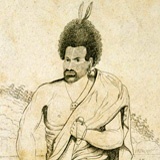 Te Pahi
Te Pahi
Ngāpuhi chief Te Pahi was the first influential Māori leader to have significant contact with British colonial officers.
Read more... -
 Te Rangihiwinui, Te Keepa
Te Rangihiwinui, Te Keepa
Muaūpoko, Ngāti Apa and Whanganui chief who joined the Armed Police Force and fought in campaigns against the Hauhau, Te Kooti and Tītokowaru during the 1860s.
Read more... -
 Te Rangi-pūawhe, Te Keepa
Te Rangi-pūawhe, Te Keepa
As a major in the New Zealand Militia, Te Keepa Te Rangi-pūawhe led a contingent of the Te Arawa tribe, which pursued the rebel leader Te Kooti into the Urewera region.
Read more... -
 Te Rangitake
Te Rangitake
Te Ati Awa leader Wiremu Kīngi Te Rangitāke's refusal to give up his land at Waitara led to the outbreak of the Taranaki War. In later life joined the pacifist community at Parihaka.
Read more... -
 Te Rauparaha
Te Rauparaha
Te Rauparaha was a Ngāti Toa chief and warrior. Sometimes called the 'Napoleon of the Southern Hemisphere', he ruled the lower end of the North Island from his base at Kapiti Island for the best part of 20 years
Read more... -
 Te Waharoa, Wiremu Tāmihana Tarapipipi
Te Waharoa, Wiremu Tāmihana Tarapipipi
Ngāti Hauā chief who took a leading role in forming the King Movement (Kīngitanga) and the election of Pōtatau Te Wherowhero as the first Māori King.
Read more... -
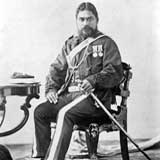 Te Wheoro, Wiremu Te Morehu Maipapa
Te Wheoro, Wiremu Te Morehu Maipapa
Wiremu Te Wheoro (?–1895) was a chief of Ngāti Naho. He was a stern critic of government policies toward Māori, accompanying King Tāwhiao to England in 1884, where they tried to appeal directly to Queen Victoria for the redress of grievances.
Read more... -
 Te Wherowhero, Pōtatau
Te Wherowhero, Pōtatau
In the 1850s, a movement was set up to appoint a Māori king who would unite the tribes, protect land from further sales and make laws for Māori to follow. Te Wherowhero became the first Māori king in 1858.
Read more... -
 Wahanui Huatare
Wahanui Huatare
Ngāti Maniapoto leader, Wahanui Huatare, was a notable tohunga (Māori spiritual expert) and an influential chief.
Read more... -
 Wahawaha, Rāpata
Wahawaha, Rāpata
Ngāti Porou leader Rāpata Wahawaha opposed the Pai Mārire religion and sided with the government against its followers. He was later presented with a ceremonial sword by Queen Victoria for services to the Crown during the New Zealand Wars.
Read more... -
 Carroll, Alfred (Turi)
Carroll, Alfred (Turi)
Turi Carroll put much of his energy into national Māori organisations.
Read more... -
 Te Rata Mahuta Tāwhiao Pōtatau Te Wherowhero Korokō
Te Rata Mahuta Tāwhiao Pōtatau Te Wherowhero Korokō
The fifth Māori King, Korokī Te Rata Mahuta Tāwhiao Pōtatau Te Wherowhero struggled to maintain the dignity of the Kīngitanga and obtain recognition during his reign.
Read more... -
 Māwhete, Rangiputangatahi
Māwhete, Rangiputangatahi
Involved in local and national politics, Rangiputangatahi Māwhete, worked hard for Māori in the Manawatū during the 1930s and 1940s. He was particularly active in the Māori War Effort Organisation during the Second World War.
Read more... -
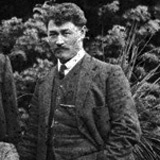 Mitchell, Henry Taiporutu Te Mapu-o-te-rangi
Mitchell, Henry Taiporutu Te Mapu-o-te-rangi
Te Arawa leader Tai Mitchell carried out a wide range of social and economic activities as chairman of the Arawa Trust Board. He was a firm supporter of Āpirana Ngata's land development schemes, and helped persuade Te Arawa to participate in them.
Read more... -
 Paikea, Paraire Karaka
Paikea, Paraire Karaka
Te Uri-o-Hau Methodist minister and Rātana leader, Paraire Paikea, played a leading role in forging the historic alliance between the Rātana movement and the Labour Party. He was minister in charge of the Māori war effort during the Second World War.
Read more... -
 Pōmare, Māui Wiremu Piti Naera
Pōmare, Māui Wiremu Piti Naera
Māui Pōmare was the first Māori doctor. As Māori Medical Officer, toured Māori districts in this role, advising people about public health. Pōmare became a member of Parliament in 1911, and minister of health in the 1920s.
Read more... -
 Rata, Matiu
Rata, Matiu
As minister of Māori affairs Matiu Rata helped set up the Waitangi Tribunal in 1975. He later left the Labour Party to form Mana Motuhake, the first modern Māori politcal party.
Read more... -
 Rātana, Tahupōtiki Wiremu
Rātana, Tahupōtiki Wiremu
Tahupōtiki Wiremu Rātana, of Ngāti Apa and Ngā Rauru, founded the Rātana Church, which remains a major religious and political force today.
Read more... -
 Rickard, Eva
Rickard, Eva
Eva Rickard was one of the most outspoken Māori land-rights campaigners of the 1970s.
Read more... -
 Te Heuheu Tūkino VI, Hoani
Te Heuheu Tūkino VI, Hoani
As chairman of the Ngāti Tuwharetoa Trust Board, Hoani Te Heuheu, advised Ngāti Tūwharetoa on taking stock of its resources, both land and people, and planning a future based on economic and social principles.
Read more... -
 Te Kawau, Āpihai
Te Kawau, Āpihai
Te Kawau was a Nāgti Whātua leader who signed the Treaty of Waitangi at Manukau Harbour in March 1840. He later worked with European magistrates to settle disputes among Māori.
Read more... -
 Te Ua Haumēne
Te Ua Haumēne
In 1862 Te Ua Haumēne established a new religion, Hauhau based on the principle of pai marire – goodness and peace. Most settlers viewed Hauhau as a anti-European religion that became synonymous with ‘violence, fanaticism and barbarism’.
Read more... -
 Rātana, Iriaka Matiu
Rātana, Iriaka Matiu
The first Māori woman to be elected to Parliament, Iriaka Matiu Rātana was a passionate advocate for the welfare of her people.
Read more...
Related keywords
- te kooti
- new zealand wars
- iriaka ratana
- Maori MPs
- labour party
- suffrage campaign
- pukearuhe
- kingitanga
- riwha titokowaru
- race relations
- petone
- NZ Wars memorial
- wellington wars
- honiana te puni
- maori
- tukaroto potatau matutaera tawhiao
- taupiri
- potatau te wherowhero
- waikato
- pai marire
- flags
- rangitane
- rangiputangatahi mawhete
- te reo māori
- land claims
- ngati whanaunga
- kotahitanga
- hamiora mangakahia
- ngati naho
- wiremu te wheoro
- te atairangikaahu
- henare kaihau
- ngati te ata
- ngati tuwharetoa
- horonuku te heuheu tukino iv
- tongariro
- wellington city
- legislative council
- te ati awa
- wi tako
- tahupotiki wiremu ratana
- te uri-o-hau
- paraire paikea
- ngati kahungunu
- turi carroll
- ngati pikiao
- tai mitchell
- tuhourangi
- te arawa
- te keepa te rangi-puawhe
- karaitiana takamoana
- ngapuhi
- hirini taiwhanga
- aperahama taonui
- treaty signatories
- treaty of waitangi
- te aitanga-a-mahaki
- te whanau a kai
- rongowhakaata
- wiremu pere
- nireaha tamaki
- ngati porou
- rapata wahawaha
- hone tawhai
- maori land
- ngati maniapoto
- wahanui huatare
- henare matua
- apihai te kawau
- ngati whatua
- musket wars
- te pahi
- whangaroa
- boyd incident
- whanganui city
- muaupoko
- major kemp
- te keepa te rangihiwinui
- iwikau te heuheu tukino iii
- ngati tamatera
- tāraia ngākuti te tumuhuia
- ngati maru
- pomare II
- northern war
- kawhia
- john ormsby
- king koroki
- te hapuku
- women in politics
- te rarawa
- meri mangakahia
- ngati toa
- wiremu parata
- ngati kuri
- matiu rata
- waitangi tribunal
- maui pomare
- ngati mutunga
- maori health
- maps
- missionaries
- religion
- te ua haumene
- ngati haua
- wiremu tamihana tarapipipi te waharoa
- taranaki
- waitara
- wiremu te rangitake
- MPs
- hone heke ngapua
- tainui
- hoani te heuheu tukino vI
- new zealand medal
- whanganui war
- hori te anaua
- hoani hipango
- henry russell
- ngaruawahia
- raglan
- eva rickard
- railways
- king country
- queen victoria
- rewi maniapoto
- queen elizabeth
- turangawaewae
- royal tours
- royalty
- land confiscation
- maori housing
- topine te mamaku
- painting
- te rauparaha
- george grey
- thomas gore browne
- protest
- wiremu kingi
- anzac day
- 1920s
- wairau incident
- te rangihaeata
- tamati waka nene
- ngati mahuta
- pirongia
- chatham islands
- ringatu
- turanganui-a-kiwa
- pre-1840 contact
- 1970s
- ngati apa
- nga rauru
- disasters
- vietnam war
- television
- 1960s
- hone heke
- hariata rongo
- joseph merrett
- te ruki kawiti
- tuheitia paki
- george french angas
- waikato wars
- elizabeth pulman
- photography
- te puea herangi
- conscientious objection
-
Main image: Te Kooti in 1887
Portrait of Te Kooti, possibly at Rotorua in 1887.

